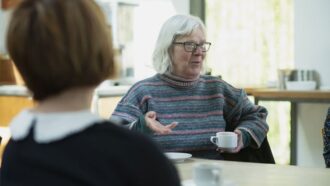End-of-life arrangements can be deeply emotional, especially when families are faced with decisions about burial or funeral rites. Of course, these moments are focused on the need to honour a loved one. But they often reflect longstanding family dynamics, cultural traditions, generational expectations, and personal values. When views differ, even among close relatives, tensions can arise.
The Roots of Disagreements
Different Values
Family members may hold differing beliefs about what constitutes a respectful farewell. One person might value tradition and religious rituals, while another prefers a more modern celebration of life. Whether to choose a burial, cremation, or a mausoleum is another big decision that involves differing values, especially when different religious beliefs are involved.
Unclear Directives
If your loved one hasn’t left clear instructions for their burial wishes, it will usually be based on memories or assumptions. The lack of clarity can create confusion and disagreement. Conflicting accounts of “what they would have wanted” can lead to emotionally charged debates, especially if decisions must be made quickly.
Financial Disparities
Not all family members have the same financial resources, and funeral arrangements and burials can be costly. One relative may be willing to spend significantly more than others, creating tension over how expenses should be divided. Disagreements may also arise about what’s financially “appropriate,” especially if no pre-planned arrangements or funds are in place.
The Importance of Documentation
Having written documentation is crucial in preventing conflict. It helps eliminate guesswork during emotionally charged times. They can also help prevent conflict by giving families a common reference point. If these documents don’t yet exist, consider encouraging loved ones to formalize their wishes while they’re still able. During end-of-life care, it’s especially important to make sure these documents are up to date and finalized. It can be incredibly emotional to do, and a lot of people struggle with essentially planning a burial and funeral while the person is still alive. But without it, the risk of conflict greatly increases.
How Do I Navigate Conflict?
Maybe you are in conflict now and find yourself struggling to juggle what you want, what your other family members want, and what you know your loved one would have wanted. No one can deny that it’s a time of high stress and heavy emotions, but stepping back and trying to use more foresight can make the process much smoother.
Focus on Their Wishes
Center the conversation around what your loved one would have wanted. If they left written instructions, use those as your guide. If not, try to remember any conversations or preferences they expressed. Shifting the focus from “what we want” to “what they wanted” helps make it easier to come to a united front.
Acknowledge Others’ Emotions
Everyone grieves differently. Acknowledging that emotions are high and that disagreement doesn’t equate to disrespect can facilitate more compassionate dialogue. Try to listen actively and validate each person’s perspective.
Maybe your loved one asked for their ashes to be spread in a specific spot, but a family member is opposed and wishes for them to be buried in a cemetery. It’s easy to dismiss them, even call them selfish for not respecting the deceased’s wishes, but stepping back and looking at it from their perspective is essential. Do they want a place to visit and feel close to the person who passed? In that case, having a cenotaph or memorial tombstone is a way to both honour the person’s wishes and acknowledge the emotions of others.
Seek Support
When conflicts escalate or reach a standstill, involving a neutral third party can be really helpful. Funeral directors or faith leaders can help find a compromise. You can even hire professional mediators who have experience dealing with these kinds of situations and can help bring clarity during difficult decisions. If your loved one is in end-of-life care, it’s especially important to involve third parties, such as medical professionals, to help guide decisions and ensure everyone is fully informed.
Balancing Modern Preferences with Tradition
Cultural Traditions in a Modern World
In multicultural families or communities, integrating different cultural practices can be challenging. While some may want things like open-casket viewings or specific burial attire, others may find these uncomfortable. But with openness and mutual respect, a lot of families can overcome these challenges with communication and compromise.
The Power of Compromise
Finding common ground can be blending old and new traditions together. There are many ways to strike this balance, including holding multiple ceremonies or the incorporation of music or readings chosen by younger family members into a traditional service. These thoughtful choices allow families to honour one another and their loved ones.
Final Thoughts
Burial and funeral disagreements are never just about logistics. They reflect layers of emotion and connection. Even though the primary goal is to honour the memory of a loved one, the process can bring up complicated family dynamics and stressors.
However, clear communication and a shared commitment to respect can help families navigate these challenging moments together and even bring them closer together. Whether that’s by embracing tradition, adapting to modern preferences, or finding a meaningful middle ground, the journey through disagreement can lead to deeper unity and give the whole family a chance to celebrate and honour their loved one.
With compassion, families can create a tribute that reflects not only the individual being remembered but also the collective love that surrounds them and lives on.
About Marc Bisson
Marc Bisson is the Managing Director of Catholic Cemeteries for the Archdiocese of Ottawa-Cornwall, where he helps families with burial services, including cremation, exterior plot, and urn selection. Marc holds a Bachelor of Commerce in Finance and is an experienced business executive, passionate about his work with Catholic Cemeteries and helping families through difficult times.




